湘教版初二英语同步辅导全套(含同步练习)Topic 2含答案
- 格式:doc
- 大小:75.00 KB
- 文档页数:7
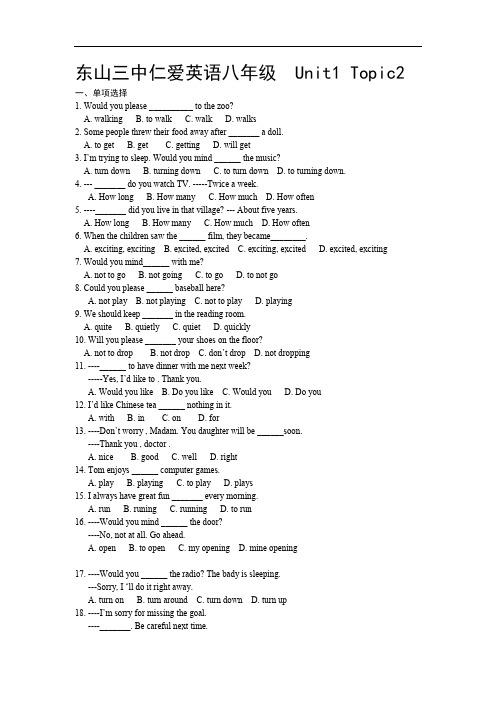
东山三中仁爱英语八年级 Unit1 Topic2一、单项选择1. Would you please __________ to the zoo?A. walkingB. to walkC. walkD. walks2. Some people threw their food away after _______ a doll.A. to getB. getC. gettingD. will get3. I’m trying to sleep. Would you mind ______ the music?A. turn downB. turning downC. to turn downD. to turning down.4. --- _______ do you watch TV. -----Twice a week.A. How longB. How manyC. How muchD. How often5. ----_______ did you live in that village? --- About five years.A. How longB. How manyC. How muchD. How often6. When the children saw the ______ film, they became________.A. exciting, excitingB. excited, excitedC. exciting, excitedD. excited, exciting7. Would you mind______ with me?A. not to goB. not goingC. to goD. to not go8. Could you please ______ baseball here?A. not playB. not playingC. not to playD. playing9. We should keep _______ in the reading room.A. quiteB. quietlyC. quietD. quickly10. Will you please _______ your shoes on the floor?A. not to dropB. not dropC. don’t dropD. not dropping11. ----______ to have dinner with me next week?-----Yes, I’d like to . Thank you.A. Would you likeB. Do you likeC. Would youD. Do you12. I’d like Chinese tea ______ nothing in it.A. withB. inC. onD. for13. ----Don’t worry , Madam. You daughter will be ______soon.----Thank you , doctor .A. niceB. goodC. wellD. right14. Tom enjoys ______ computer games.A. playB. playingC. to playD. plays15. I always have great fun _______ every morning.A. runB. runingC. runningD. to run16. ----Would you mind ______ the door?----No, not at all. Go ahead.A. openB. to openC. my openingD. mine opening17. ----Would you ______ the radio? The bady is sleeping.---Sorry, I ‘ll do it right away.A. turn onB. turn aroundC. turn downD. turn up18. ----I’m sorry for missing the goal.----_______. Be careful next time.A. My pleasure.B. Never mindC. Don’t mention itD. You are always careless.19. -----Kangkan doesn’t pass the exam again.----His mother must be ______ with him.A. happyB. sadC. angryD. sorry.20. They’ll have fun _____ English with foreigners.A. practice speakingB. practice to speakC. to practice speakingD. practicing speaking21. When she was a _______ gril, she could ride a bicycle.A. four-year-oldB. four-years-oldC. four year oldD. four-year old22. He beliveves exercising and healthy eating can______.A. build him upB. build up himC. build him aroundD. build around him23. Summer is coming, and the weather gets _______.A. more and more hotterB. hotter and hotterC. more hot an hotD. hoter and hoter24. My little brother likes doing sports very much. He feels _____ and looks______.A. well, happilyB. good ,fitC. fine,unhappyD. well, fit25. His good friend______, so he looks unhappy today.A. felt illB. falls illC. fell illD. was sick.二、根据汉字提示完成句子。
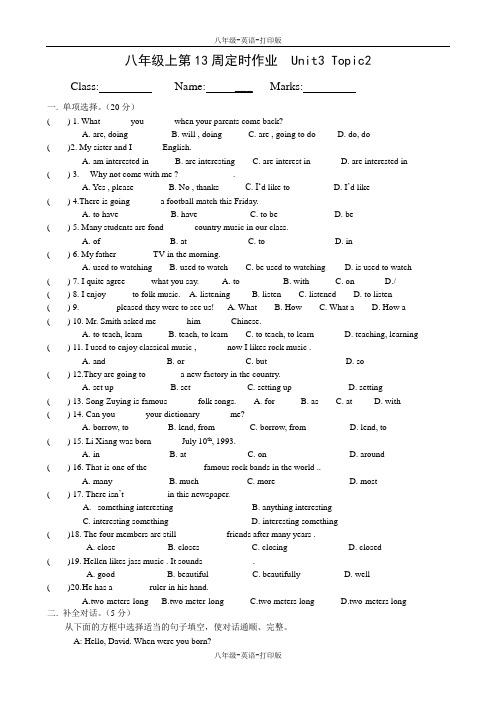
八年级上第13周定时作业 Unit3 Topic2 Class: Name: ___ Marks:一. 单项选择。
(20分)( ) 1. What ______ you ______ when your parents come back?A. are, doingB. will , doingC. are , going to doD. do, do( )2. My sister and I ______ English.A. am interested inB. are interestingC. are interest inD. are interested in ( ) 3. ---Why not come with me ? ---______ .A. Yes , pleaseB. No , thanksC. I‘d like toD. I’d like( ) 4.There is going ______ a football match this Friday.A. to haveB. haveC. to beD. be( ) 5. Many students are fond ______ country music in our class.A. ofB. atC. toD. in( ) 6. My father ______ TV in the morning.A. used to watchingB. used to watchC. be used to watchingD. is used to watch ( ) 7. I quite agree _____ what you say. A. to B. with C. on D./ ( ) 8. I enjoy _____ to folk music. A. listening B. listen C. listened D. to listen ( ) 9. ________pleased they were to see us! A. What B. How C. What a D. How a ( ) 10. Mr. Smith asked me ______ him ______ Chinese.A. to teach, learnB. teach, to learnC. to teach, to learnD. teaching, learning ( ) 11. I used to enjoy classical music , ______ now I likes rock music .A. andB. orC. butD. so( ) 12.They are going to _______ a new factory in the country.A. set upB. setC. setting upD. setting( ) 13. Song Zuying is famous ______ folk songs. A. for B. as C. at D. with ( ) 14. Can you ______ your dictionary ______ me?A. borrow, toB. lend, fromC. borrow, fromD. lend, to( ) 15. Li Xiang was born ______ July 10th, 1993.A. inB. atC. onD. around( ) 16. That is one of the ____________ famous rock bands in the world ..A. manyB. muchC. moreD. most( ) 17. There isn’t _________ in this newspaper.A.something interestingB. anything interestingC. interesting somethingD. interesting something( )18. The four members are still _________ friends after many years .A. closeB. closesC. closingD. closed( )19. Hellen likes jass music . It sounds _________ .A. goodB. beautifulC. beautifullyD. well( )20. H e has a ________ruler in his hand.A.two-meters-longB.two-meter-longC.two meters longD.two-meters long二. 补全对话。
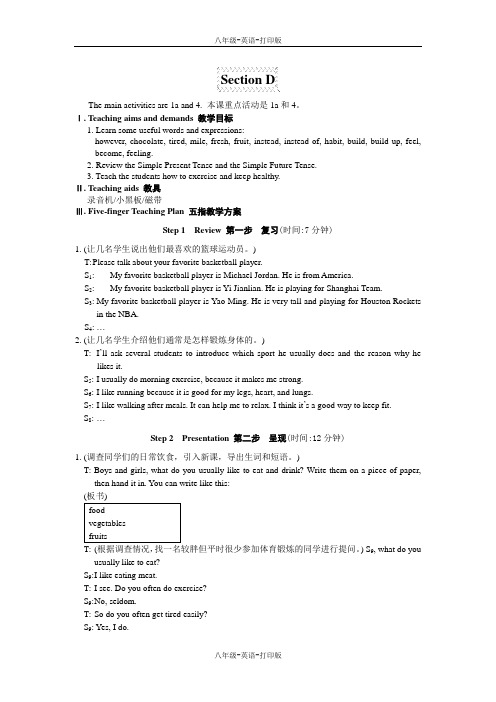
Section DThe main activities are 1a and 4. 本课重点活动是1a和4。
Ⅰ. Teaching aims and demands 教学目标1. Learn some useful words and expressions:however, chocolate, tired, mile, fresh, fruit, instead, instead of, habit, build, build up, feel, become, feeling.2. Review the Simple Present Tense and the Simple Future Tense.3. Teach the students how to exercise and keep healthy.Ⅱ. Teaching aids 教具录音机/小黑板/磁带Ⅲ. Five-finger Teaching Plan 五指教学方案Step 1 Review 第一步复习(时间:7分钟)1. (让几名学生说出他们最喜欢的篮球运动员。
)T: Please talk about your favorite basketball player.S1: My favorite basketball player is Michael Jordan. He is from America.S2: My favorite basketball player is Yi Jianlian. He is playing for Shanghai Team.S3: My favorite basketball player is Yao Ming. He is very tall and playing for Houston Rockets in the NBA.S4: …2. (让几名学生介绍他们通常是怎样锻炼身体的。
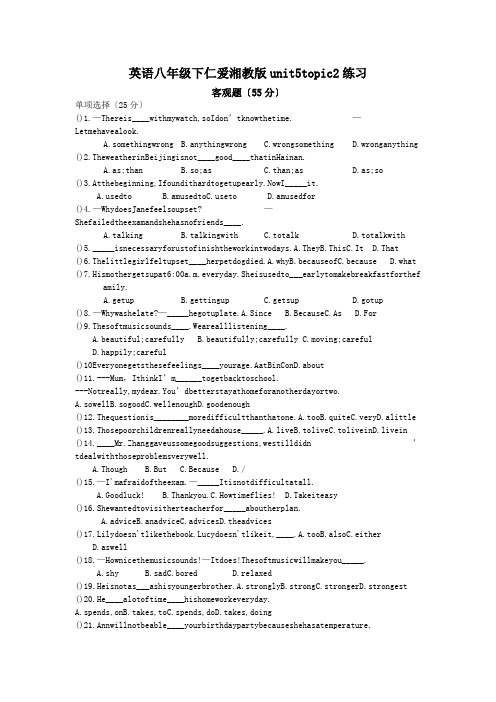
英语八年级下仁爱湘教版unit5topic2练习客观题〔55分〕单项选择〔25分〕()1.—Thereis____withmywatch,soIdon’tknowthetime. —Letmehavealook.A.somethingwrongB.anythingwrongC.wrongsomethingD.wronganything ()2.TheweatherinBeijingisnot____good____thatinHainan.A.as;thanB.so;asC.than;asD.as;so()3.Atthebeginning,Ifoundithardtogetupearly.NowI_____it.edtoB.amusedtoetoD.amusedfor()4.—WhydoesJanefeelsoupset? —Shefailedtheexamandshehasnofriends____.A.talkingB.talkingwithC.totalkD.totalkwith ()5._____isnecessaryforustofinishtheworkintwodays.A.TheyB.ThisC.It D.That()6.Thelittlegirlfeltupset____herpetdogdied.A.whyB.becauseofC.because D.what ()7.Hismothergetsupat6:00a.m.everyday.Sheisusedto___earlytomakebreakfastforthef amily.A.getupB.gettingupC.getsupD.gotup()8.—Whywashelate?—_____hegotuplate.A.Since B.BecauseC.As D.For()9.Thesoftmusicsounds____.Wearealllistening____.A.beautiful;carefullyB.beautifully;carefullyC.moving;carefulD.happily;careful()10Everyonegetsthesefeelings____yourage.AatBinConD.about()11.---Mum,IthinkI’m______togetbacktoschool.---Notreally,mydear.You’dbetterstayathomeforanotherdayortwo.A.sowellB.sogoodC.wellenoughD.goodenough()12.Thequestionis________moredifficultthanthatone.A.tooB.quiteC.veryD.alittle ()13.Thosepoorchildrenreallyneedahouse_____.A.liveB.toliveC.toliveinD.livein ()14.____Mr.Zhanggaveussomegoodsuggestions,westilldidn’tdealwiththoseproblemsverywell.A.ThoughB.ButC.BecauseD./()15.—I'mafraidoftheexam.—_____Itisnotdifficultatall.A.Goodluck!B.Thankyou.C.Howtimeflies!D.Takeiteasy()16.Shewantedtovisitherteacherfor_____aboutherplan.A.adviceB.anadviceC.advicesD.theadvices()17.Lilydoesn'tlikethebook.Lucydoesn'tlikeit,____.A.tooB.alsoC.eitherD.aswell()18.—Hownicethemusicsounds!—Itdoes!Thesoftmusicwillmakeyou_____.A.shyB.sadC.boredD.relaxed()19.Heisnotas___ashisyoungerbrother.A.stronglyB.strongC.strongerD.strongest ()20.He____alotoftime____hishomeworkeveryday.A.spends,onB.takes,toC.spends,doD.takes,doing()21.Annwillnotbeable____yourbirthdaypartybecauseshehasatemperature.A.tocometoetoesD.tocome()22.Kate’sgrandmotherlivesinahouse____,butshedoesn’tfeel____.A.alone;aloneB.lonely;lonelyC.alone;lonelyD.lonely;alone()23.Thedoctorsandnurseswereverytired,________theystillwentonworking.A.soB.andC.orD.but()24.—Mary,whataboutgoingboatingifit__________finetomorrow?—Goodidea!A.isB.willbeC.wasD.will()25.Idon’tliketospeakEnglishbecauseI’mafraid___________mistakes.A.makingB.tomakeC.ofmakingD.tomaking完形填空〔10分〕Happinessisforeveryone.Infact,happinessisalwaysaroundyouifyoucareaboutit.Wh enyouarein26atschool,yourclassmateswillhelpyou;whenyoustudyhardatyour27,yourparen tsarealwaystakinggood28ofyou;whenyougetsuccess(成功),yourfriendswillsaycongratulations29you;whenyoudosomething30,peoplearoundyou willhelpyoucorrect〔纠正〕it;andwhenyoudosomethinggoodto31,youwillfeelhappy,too.Allthesethingsare32.Ifyou payattentiontothem,youcanseehappinessisalways33you.Happinessisnotthesameasmoney .Whenyouarepoor,youcansayyouareveryhappy,becausepeoplecan’tbuyhappiness34money.Whenyoumeetproblems,youcanalsosayloudlyyouareveryhappy,bec auseyouhavemanyfriendstohelpyou.Soyoucan’talwayssayyouarepoorandyouhavebadluck.Ifyouagreewithme,youcanbeahappyand35person .()26.A.students B.trouble C.room D.office()27.A.newspapers B.cards C.lessons D.books()28.A.friendship B.knowledge C.our D.care()29.A.to B.for C.on D.by()30.A.wrong B.right C.badly D.worse() B.them C.others D.yourself()32.A.teachers B.happiness C.friends D.parents()33.A.within B.between C.around D.among()34.A.without B.on C.by D.with()35.A.lucky B.good C.able D.unable阅读理解〔20分〕(A)Whenyoufeelsad,tearswillcomedownfromyoureyes.Whenyouarehappy,especiallywhen youlaughhard,tearswillalsocomedownfromyoureyes.Buttearshaveamoreimportantjobtha nshowingyourfeelings.Tearskeepyoureyescleanandhealthy.Theywashawaydirtandgermsjustlikebath.Youre yesalsoneedtearstokeepthemwet.Andeyesmustbewetsothattheycanmovesmoothly.Youreye sarebusylookinghereandtherealldaylong.Theymovequicklyfromonethingtoanother.Ifyo udidn’thavetears,youreyescouldn’tmove,andsoonyouwouldbeblind.Maybeyoudon’tliketears,butyoureyescan’tdowithoutthem.()36.Thestorytellsus____.A.whatmakespeopleblindB.whypeoplehavetearsC.whypeoplecrywhentheyaresadD.whattearsare()37.Tearshelpyouby____.A.showinghowyoufeelB.makingyourfacecleanC.washingthingsfromyoureyesD.makingyoureyesbright()38.Ifyoureyeswerenotwet,youcouldnot____.A.lookatthingsclearlyughandcryC.keepcleanD.showyourfeelings()39.Whenyouarehappyorsad,youmay____.A.lookatthingsquicklyB.washawaydirtandgermsC.havetearsinyoureyesD.moveyoureyesquickly()40.Thesentence“youreyescan’tdowithoutthem”means____.A.youreyeslikehavingbathsverymuchB.youreyesliketearsverymuchC.youreyescan’tworkwithouttearsD.youreyescan’topenwithoutthem(B)Doyougetangrywhenyourfriendssingloudly?Orwhenyourbestfrienddoesnotwaitforyo uafterschool?Ifyoudo,youneedtocontrolyourfeelingsandstopgettingangrysoeasily.Gettingangr yeasilycanmakeyoulosefriends.GaryEgeberg,anAmericanhighschoolteacher,wrote MyFeelingsareJustLikeWildAnima ls tohelpyoucontrolyourfeelings.Ittellsteens〔青少年〕howtostaycoolwhenbadthingshappentothem.Thebooksaysthatgettingangryonlymakesprob lemsworse.Itcannotmakethembetter.“Gettingangryisnotanaturalwaytoact”,thebooksays.Itisjustabadhabit,likesmoking .Thebooksaysyoucancontrolyourangereasily,andallyouhavetodoistotellyourselfnotto beangry.Whenababyfallsover,itcriesonlywhenpeoplearewatchingit.Likeababy,youcanonlyg etangryifyouaresureitistherightthingtodo.Thebookgivesmanysuggestionstohelpyouifyougetangryeasily.Herearethetopthree.①Keeparecord.Everytimeyougetangry,writedownwhyyouareangry.Lookatitlaterandyouwil lseeyougetangrytooeasily.②Askyourfriendstostoptalkingtoyouwhenyougetangry.Thiswillteachyounottobeangry.③Dosomethingdifferent.Whenyougetangry,walkawayfromtheproblemandgosomewhereelse.T rytolaugh!()41.Thewriterwantstotellus____.A.nottogetangryeasilyB.toworkhardatschoolC.todomoreexercisesD.tohelpeach other()42.Thewriterthinksthatifyougetangryeasilyyouwill____.A.getillveryeasilyB.loseyourfriendsC.putonweighteasilyD.eatless()43.MyFeelingsareJustLikeWildAnimals isa____.A.storyB.bookC.pictureD.film()44.MyFeelingsareJustLikeWildAnimals mainlytellsus____.A.whattoreadB.howtoreadC.howtostaycoolD.howtolearnEnglishwell()45.Inthefourthparagraph,theunderlinedword“it”refersto(指的是)____.A.thebookB.angerC.habitD.thebaby写作〔45分〕【一】依照句意及汉语提示填空,注意词的适当形式。
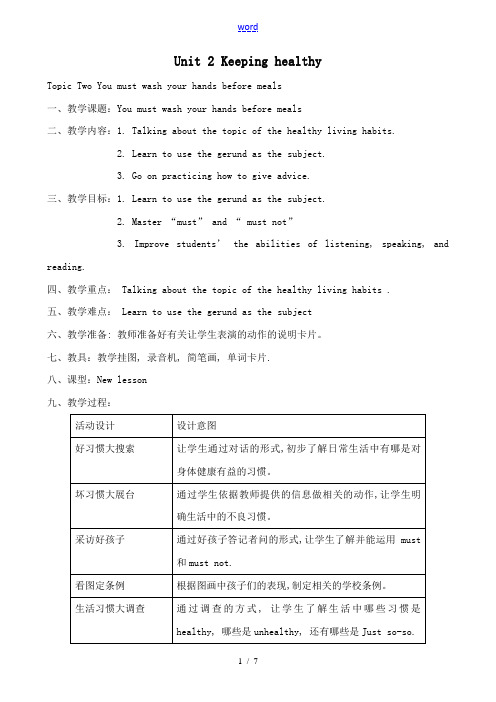
Unit 2 Keeping healthyTopic Two You must wash your hands before meals一、教学课题:You must wash your hands before meals二、教学内容:1. Talking about the topic of the healthy living habits.2. Learn to use the gerund as the subject.3. Go on practicing how to give advice.三、教学目标:1. Learn to use the gerund as the subject.2. Master “must” and “ must not”3. Improve students’the abilities of listening, speaking, and reading.四、教学重点: Talking about the topic of the healthy living habits .五、教学难点: Learn to use the gerund as the subject六、教学准备: 教师准备好有关让学生表演的动作的说明卡片。
七、教具:教学挂图, 录音机, 简笔画, 单词卡片.八、课型:New lesson九、教学过程:Teaching procedureSection AStep 1 Review1. get the students revise the sentences : “ What ‘s the matter with you? “2. Have a dictation.Step 2 PresentationDraw a boy and a TV on the blackboard, then tell the students, The boy is watching TV,Next, draw a clock, show the time is 9:00 p.m. and then change it to 12:10, Now teach the new phrases: “ staying up late”Ask the students: “I s staying up late good or bad for your health?”Help the students to answer: It’s bad / good.Step 3 Pair workGet the students to act the statements about the habits, and then teach the new phrases1. keeping long fingernails.2. washing hands before meals.3. going to bed early.Step 4 DiscussionGet the students to discuss What kinds of habit are good or bad?Then let them to write down something about them.For example: 1. Getting up late.2. Going to bed early.3. Doing morning exercise.4. Keeping long fingernails.5. Washing hands before meals.6. playing sports right after meals.Step 5 Look, listen and read.1. Get the students look at the picture , then play the tape, let students do2.2. Play again, let students follow the dialog and check the answer to “How did Wang Juen get a headache?Step 6 Practice1. Get the students to ask and answer.2. To talk about the good habits or bad habits.Step 7 Class activitiesGet the students listen, read, and chant.Section BStep 1 Revision1. using the flashing cards to revise the new words, and then have a dictation.2. go on with the report on healthy habits.Step 2 Presentation1. Get some students do some action in front of the classroom follow the order that the teacher give.2. let the students to know the good habits on the blackboard.Step 3 Consolidation1. let the students retell the passage according to the key words on the blackboard.: eat breakfast ----- gives… energy…go out for a walk ------ good exercise…necessary…drink plenty of water ------ …good … healthgo to bed early and get up early---- …keep …active …daytime.Step 4 Practice1. Do 2a, let students look at the pictures and then make sentences.2. Let the students to give a report.Step 5 Pair workGet the students look at the picture, and then discuss with their partner, at last make them to write down the school notices.1. You must not walk on the lawn. / Don’t walk on the lawn.2. You must not climb the tree. / Don’t climb the tree.3. You must not park the car near the school buildings./ Don’t par the car near the school buildings.4. You must not take your pets to school./ Don’t take your pets to school.5. You must not throw the litter about. / Don’t throw the litter about.Section CStep 1 Review1. Let the students review the sentences : You must …/ You must not ….2. Talking about the illness with the pictures.Step 2 Presentation1. Get a student act having a fever, then ask him “ what’s the trouble with you? Then help him to answer: I have a fever and a pain on my head.Ask the students: Do you know What may cause the headache?Play the tape recorder 1. Let students tell “True”or False”about these sentences: ( ) 1. A headache is a disease.( ) 2. A headache may show that something in your body is wrong.( ) 3. We may have more than one headache each week.( ) 4. Headaches can often make you worried.( ) 5. You needn’t go to see a doctor when you have a headache.2. Call the students read the passage quickly and master the main idea.3. Read the passage more carefully. Then finish the questions.Step 3 ConsolidationCheck the students’answers. Then write some key words of the answers on the blackboard. Let the students retell the passage according to the key words.Step 4 Pair workGet five students to act the germ, nose, body, mouth, skin, then ask the germ to talk about others. After that, the other have illness.Then ask the students “ What should we do to fight germs?Step 5 Group workGet the students discuss with their partners, talking about the habits, which is good, and which is bad.Section DStep 1 Review1. Ask the students to revise the new words with flashing cards, and then have a dictation.2. ask the students to talk about healthy habits.Step 2 PresentationGet the students to look at the pictures, and then teach the new words: potato, strawberry, cabbage, beef,Step 3 Work aloneLet the students to divide the foods into different types.Meat:Vegetables:Fruit:Step 4 Look, read and matchGet the students talk about the relations between foods and health.Then ask the students “ What should we eat ?”Let the students read and following and imitate the reading.Step 5 Written workGet the students to write a magazine article about food and health.Start like this: We should eat more fruit like apples, oranges and strawberries…...Step 6 Make a surveyGet the students look at the chart on the book, then ask them to make a survey, Which habits do you think healthy/ unhealthy/ just so-so?Step 7 HomeworkUsing the words to fill in the blanks .1. ________ (learn) English is very useful.2. ________ (not walk) on the lawn.3. Headaches can often make you ________(忧虑).4. You need ________ (see) a doctor.5. Germs cause________ (疾病).6. We should keep the air clean and ________(新鲜).7. A poor choice of food can make us ________ (不健康)8. Food ________ (give) us energy.9. Germs can get into the human body________(通过) the skin.10. Doing morning exercise ________ (be) good for your health.十、课后小结本单元通过围绕健康的生活习惯, 学习了must 和mustn’t, should, shouldn’t 的用法, 继续运用表示建议语气的句型。
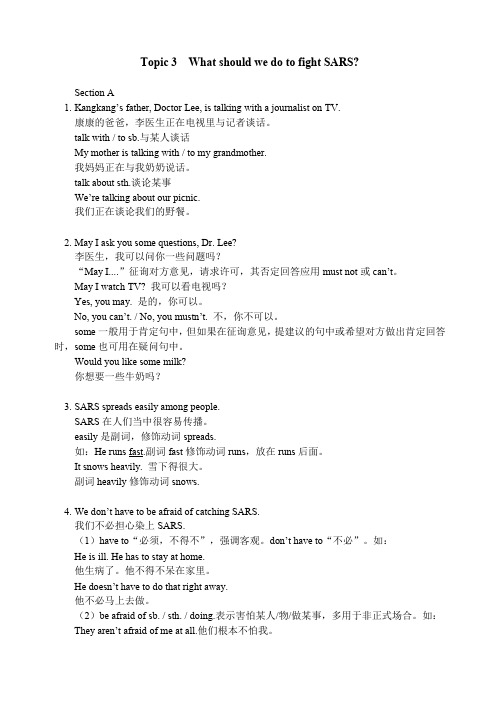
Topic 3 What should we do to fight SARS?Section A1. Kangkang’s father, Doctor Lee, is talking with a journalist on TV.康康的爸爸,李医生正在电视里与记者谈话。
talk with / to sb.与某人谈话My mother is talking with / to my grandmother.我妈妈正在与我奶奶说话。
talk about sth.谈论某事We’re talking about our picnic.我们正在谈论我们的野餐。
2. May I ask you some questions, Dr. Lee?李医生,我可以问你一些问题吗?“May I....”征询对方意见,请求许可,其否定回答应用must not或can’t。
May I watch TV? 我可以看电视吗?Yes, you may. 是的,你可以。
No, you can’t. / No, you mustn’t. 不,你不可以。
some一般用于肯定句中,但如果在征询意见,提建议的句中或希望对方做出肯定回答时,some也可用在疑问句中。
Would you like some milk?你想要一些牛奶吗?3. SARS spreads easily among people.SARS在人们当中很容易传播。
easily是副词,修饰动词spreads.如:He runs fast.副词fast修饰动词runs,放在runs后面。
It snows heavily. 雪下得很大。
副词heavily修饰动词snows.4. We don’t have to be afraid of catching SARS.我们不必担心染上SARS.(1)have to“必须,不得不”,强调客观。
don’t have to“不必”。
湘教版初二英语上册同步练习试卷及答案英语上册同步练习试卷及答案如下 I. 听句子,选择句中所听到的单词. (5分) ( ) 1.A. famous B. excited C. favorite ( ) 2.A. bicycling B. skating C. skiing ( ) 3.A. examine B. spread C. examining ( ) 4.A. remember B. December C. however ( ) 5A. far from B. all over the world C. instead of II. 听问句,选择合适的应答句. (5分) ( ) 6. A. No, thank you. B. Not at all C. I want a shirt. ( ) 7. A. Thank you all the same. B. It doesn’t matter. C. That is a good idea. ( ) 8. A. How about next Wednesday? B. What about having a party? C. Shall we go and meet them tonight? ( ) 9. A. You are welcome. B. Really? I was in the reading-room. C. I didn’t look for you. ( ) 10. A. I like it very much. B. It is very beautiful. C. I don’t like it very much. III. 听对话及问题,选择最佳答案. (5分) ( ) 11. A. Eight o’clock B. About eight o’clock. C. About seven o’clock. ( ) 12. A. Kate’s birthday. B. Ann’s birthday. C. Bruce’s birthday.。
八年级英语上册Unit 4 Topic 2单元测试题I.单项选择。
(10分)( ) 1. — Excuse me. Could you tell me __________ about robots?— Of course.A. somethingB. anythingC. everythingD. some thing ( ) 2. —He saw a UFO flying __________ his head at nine o’clock last night.— Really?A. inB. onC. overD. across( ) 3. It didn’t look like man-made objects such as a kite or a balloon, .A. alsoB. tooC. eitherD. as well( ) 4. When you a word in a dictionary, pay attention to the first letter of the word.A. look upB. look forC. look atD. look over ( ) 5. — Are you sure you will win the game?— __________A. Yes, I do.B. No, I don’t.C. Yes, I’m sure.D. Yes, I’m.( ) 6. It while I home.A. was raining, wentB. rained, wentC. is raining, wentD. rains, goes( ) 7. My friend often helps me English.A. learnB. learningC. learnsD. learnt( ) 8. Please tomorrow.A. wake up meB. wake me upC. wakes upD. to wake me up ( ) 9. People use robots for __________.A. do boring workB. do boring jobsC. doing boring workD. to do boring jobs( ) 10. We shouldn’t spend __________ it.A. much too time forB. too much time inC. too much time onD. much too time onII.补全对话。
初二英语T opic 2 You must wash your hands before meals湘教版【本讲教育信息】一. 教学内容:Topic 2 You must wash your hands before mealsGrammar focus1. 情态动词must / must not 的用法2. 掌握动名词或不定式做主语的句型Section A1. I watched a soccer game on TV last night.我昨天晚上在电视上看了场足球赛。
watch用于看电视、看球赛、看戏、看话剧等。
如:He likes watching TV.他喜欢看电视。
We watched a play in the theater yesterday.我们昨天在剧院看了一个话剧。
2. I see. 我明白了。
此句为地道的口语,在这里see不翻译为“看见”,而是指“理解、领会,明白”。
如:Let me see. 让我想想。
3. Staying up late is bad for your health.熬夜对你身体不好。
staying up late 动名词做主语,当动词做主语时,用动名词或动词不定式,谓语动词用第三人称单数,如:Watching TV too much is bad for your eyes.看电视太多对你的眼睛有害。
Washing hands before meals is good for our health.饭前洗手对我们的健康有好处。
4. If I have a headache, what should I do?如果我头疼,我该怎么办?if引导的是条件状语从句,如果主句是一般将来时,从句就用一般现在时态。
如:If it rains tomorrow, we won’t play basketball.如果明天下雨,我们就不打篮球了。
If he es tomorrow, he will have a good time.如果他明天来,他会玩得很开心。
一、选择题1.— do you exercise, Tony?—Three times a week.A.How often B.How soon C.How long D.How much A解析:A【详解】句意:——你多久锻炼一次,托尼?——每周三次。
考查疑问词辨析。
A. 多久一次,问频率;B. 多久之后,问时间,回答用“in + 时间段”;C. 多长,问时间,侧重指“一段时间”,回答用“for + 时间段”;D. 多少,问数量或价格。
根据Three times a week.可知问的是频率,故选A。
2.—__________do you watch TV every week?—Less than two hours. I often have much homework to do.A.How many B.How much C.How long D.How often C解析:C【详解】句意:——每个星期你看多久电视?——不到两个小时。
How many多少,询问数量多少;How much多少,询问数量多少;How long多长时间;How often多久一次。
根据下文,不到两小时,是指时间段。
故答案为C。
3.---I think there will be __________ air pollution whenever there are _________ people driving--- That’s true! I hope the air will be fresher soonA.less; less B.less; fewer C.fewer; fewer D.fewer ;less B解析:B【解析】【详解】句意:----我认为只要少开车,空气污染就会减少。
----这是真的!我希望空气很快将变得更清新。
考查形容词辨析。
less:比较少的,更少的,表示否定意义,little的比较级,修饰不可数名词;fewer,比较少的,更少的,表示否定意义,few的比较级,修饰可数名词复数。
Topic 2 I’m sure there are no UFOsSection C1. We can use the Internet for finding a job.我们可以利用网络找工作。
use sth for sth / doing sth 利用某物来做某事。
for为介词,后面接名词、代词或动名词结构,在此表目的,for也经常表示原因。
如:Thanks for helping me.谢谢你帮助我。
(表原因)We use the knife for cutting things.我们使用小刀来切东西。
(表目的)2. We shouldn’t spend too much time on the Internet.我们不应该在因特网上花费太多的时间。
spend的主语经常是人,用来表示花钱买东西或花费时间做某事。
即:主语+spend+time/ money+on sth/(in)doing sth如:I spent 5 yuan on the book.我花了5块钱买了这本书。
I spent 10 minutes (in)drawing a dog.我花了10分钟画了一只狗。
3. We can do shopping at home.我们在家就能购物。
do shopping=do some shopping=shop“购物,买东西”类似结构。
do reading=do some reading=read“看书,阅读”do washing=do some washing=wash“洗一洗,洗衣服”do cleaning=do some cleaning=clean“打扫卫生”do running=do some running=run“跑步”4. I’m glad to tell you I learned how to use the English-Chinese dictionary.我很高兴地告诉你,我学会了怎样使用英汉词典。
how to do sth如何去做某事,怎样去做某事,动词不定式短语由特殊疑问词与动词不定式构成。
如:Can you tell me how to cook?你能告诉我怎样去做饭吗?I don’t know whom to ask.我不知道该去问谁。
They don’t know where to go.他们不知道该去哪里。
5. The words in dictionaries are listed in alphabetical order.词典的词是以字母顺序排列的。
(1)list动词,把……列入一览表(目录、清单)如:Can you list your favourite food?你能把你喜欢的食物列出来吗?(2)in alphabetical order按照字母顺序6. When you look up a word in the dictionary, pay attention to the first letter of the word.你查字典时,应注意单词的第一个字母。
(1)look up查询……,查找……look up a word in the dictionary“查字典”(2)pay attention to...“注意……,留意……,当心……”You must pay attention to the teacher.你必须注意听老师讲课。
Pay attention to what you are doing.注意你正做的事。
7. When two words begin with the same letter, you have to look at the second letter to find the word.当两个单词都是同一个字母开头时,你就得看第二个字母来查找单词。
begin with...=start with...“以……开始”如:The concert began with a piano solo.音乐会以一首钢琴独奏曲开始。
The day began with rain.天亮时下着雨。
8. You should buy a good dictionary and give it a try.你应该买一本好词典并试试看。
give it a try是美国英语,试试看=have a trySection D1. I pressed the “On”switch but nothing happened.我按了“开”键,但它没反应。
switch名词,开关,电闸;动词,打开,接通happen=take place动词,发生happen to sb/ sth……发生……如:How did the accident happen?事故是怎样发生的?What happened to you?你发生什么了?If anything happens to him, let me know.如果他发生什么事,请让我知道。
2. You’d better ask our computer teacher for help.你最好向我们的计算机老师求助。
ask(sb)for sth向……要……如:She asked me for a phone card.她向我要了张电话卡。
You can ask your parents for money.你可以向你的父母亲要钱。
Grammar focus:形容词的比较等级形式1. 英语中大多数形容词有原级、比较级和最高级的形式,表示三种不同的程度。
如:tall 高,taller更高,tallest最高。
2. 形容词比较级、最高级的规则形式(1)一般在词尾加er,-est如:high-higher-highest clever-cleverer-cleverest(2)以e结尾的加r,st如:nice-nicer-nicest large-larger-largest(3)以辅音字母+y结尾的单词改y为i,再加er,est。
busy-busier-busiest heavy-heavier-heaviest(4)重读闭音节结尾,而末尾只有一个辅音字母的词,双写这个辅音字母后再加er,est。
如:thin-thinner-thinnest wet-wetter-wettestbig-bigger-biggest hot-hotter-hottest(5)多音节词和部分双音节词前加more,most如:famous-more famous-most famousbeautiful-more beautiful-most beautifulserious-more serious-most serious注意,形容词最高级前要加定冠词the。
3. 有一部分的形容词比较级和最高级形式是不规则的。
(1)有些单音节词、双音节词用er,est或more,most皆可如:free, clear, glad, shy, pretty, lively(2)goodwellbetter best ⎫⎬⎭--badillbadlyworse worst ⎫⎬⎪⎭⎪--m a n y m u c h m o r e m o s t⎫⎬⎭--l i t t l e f e w l e s s l e a s t⎫⎬⎭--farfarther farthestfurther furthest ---⎧⎨⎩l a t e l a t t e rl a s t l a t e r l a t e s t---⎧⎨⎩4. 形容词比较级的句型(1)甲和乙相同,用as+原级+as...如:He is as old as I. 他和我一样大。
I am as tall as you. 我和你一样高。
(2)甲不如乙,用“not so / as+原级+as...”如:You are not so/ as clever as your brother.你不如你哥哥聪明。
He isn’t so/ as tall as you.他不如你个子高。
(3)甲超过乙,用比较级+than...如:He runs faster than you. 他比你跑得快。
He is earlier than you. 他比你早。
5. 形容词的最高级,三者或三者以上相比较时用最高级形式,形容词最高级前面通常用定冠词the+最高级形式+in(或of,among)介词词组,如:She is the best student in our class.她是我们班上最好的学生。
He is the tallest among the boys.他是男孩中最高的。
He is the busiest of the three.他是三个人中最忙的。
6. 形容词的比较级可以用much或a lot“……得多”a little“一点儿”,even“甚至,更”等副词修饰表示He is much taller than I. 他比我高得多。
Yesterday it was cold, but today it is even colder.昨天冷,但今天更冷。
7. 形容词比较级表示“越来越……”,用“形容词比较级+and+形容词比较级”和“more and more+原级”表示如:Days are getting longer and longer.白天越来越长。
It’s more and more importan t to protect our environment.保护环境越来越重要。
8. 表示越……越……用the+比较级,the+比较级表示。
如:The more, the better.越多越好。
The more you eat, the fatter you’ll be.你吃的越多,你就会越胖。
【模拟试题】(答题时间:40分钟)I. 单项选择1. We spent the whole day ____________ trees on the hill.A. plantedB. to plantC. plantD. planting2. Jack likes to make people ____________ and play jokes ________ his friends.A. laugh, onB. to laugh, toC. laugh, withD. to laugh, with3. Are you __________ your answer?A. sureB. sure toC. sure forD. sure of4. I’d like to read books __________ by Bill Gates.A. writesB. writtenC. wroteD. writing5. I was drawing a cat __________ the teacher came in.A. whenB. whileC. butD. what time6. It’s too dark. Let’s __________ the lights.A. switch offB. switch onC. turn outD. turn down7. People often _________ some objects _________ a UFO.A. mistake, asB. mistake, forC. mistakes, asD. mistakes, for8. Which would you like, coffee or tea?________________ is OK.A. BothB. AnyC. EitherD. None9. He ______________ very well that day.A. was feelB. did feltC. wasn’t feelingD. feels10. I used to __________ school when I was young.A. walkB. walk toC. walk inD. walk forII. 完形填空I think the best place to go on Sunday 1 the zoo. When you are 2 , you can go there with your family 3 the zoo, there are many animals: elephants, pandas, 4 , tigers and other animals. Elephants are the 5 animal on land. I 6 there is a baby elephant in our zoo. So I want to 7 at it. Linda wants to go with me. She says. “8 we go there together? ”“Sure!”I say. “We will have a good time there. But let’s make 9 half past four.I have 10 homework to do.”()1. A. does B. are C. is D. is going to()2. A. busy B. free C. young D. clean()3. A. In B. On C. For D. Near()4. A. monkeys B. monkies C. liones D. peacock()5. A. youngest B. heaviest C. biggest D. tallest()6. A. listen B. listen to C. hear of D. hear()7. A. looks B. have a look C. see D. watch()8. A. Can B. Could C. Shall D. Would()9. A. us B. it C. them D. you()10. A. a few B. little C. much D. manyIII. 用括号内所给词的适当形式填空1. People loves animals because they can bring us __________(happy)2. I teach ___________(my)English.3. He likes rock music ____________(well)of all.4. Shanghai is one of the _________(famous)cities in China.5. He thinks ____________(play)the drum is exciting.6. What a ____________ (wonder)movie!7. This was the _______________(begin)of the weekend.8. He felt too tired _____________(work)on Mondays.9. Were you doing some ____________(wash)at 8:00 yesterday?10. In spring, it returns to the fresh water stream ___________ (lay)eggs.【试题答案】I.1. D2. A3. D4. B5. A6. B7. B8. C9. C 10. BII. 1. C 2. B 3. A 4. A 5. C6. D7. B8. C9. B 10. CIII. 1. happiness 2. myself 3. best 4. most famous 5. playing 6. wonderful 7. beginning 8. to work 9. washing10. to lay。